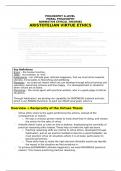Summary
Summary ARISTOTELIAN VIRTUE ETHICS AQA PHILOSOPHY - complete notes for aqa a-level philosophy
- Course
- Institution
This document is tailored to AQA Philosophy A-Level. It is a complete set of notes on Aristotelian Virtue Ethics, including counterarguments and replies etc. There are notes on the reciprocity of the virtues thesis, significance of voluntary/non-voluntary/involuntary/mixed action types, the golden ...
[Show more]



